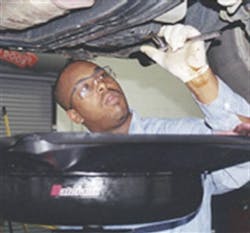Synthetics vs. conventional oils: Manufacturers go with the flow
Are synthetic lubricants the wave of the future? Oil companies seem to think so. Although engines have downsized over the years, they have improved their horsepower per cubic inch. And as engines have evolved, so have motor oils.
"The challenge for the oil companies is to create thinner and thinner oils that create less drag on the engine so the engine can get greater fuel economy while protecting highly stressed parts," says Ray Sparling, brand manager for the Kendall Motor Oil division of ConocoPhillips Inc.
That's what synthetic oils and synthetic blends are designed to do. They flow quickly when the engine is turned over -- reducing drag -- perform well under extreme heat and flow rapidly through the engine in cold weather.
The manufacture of synthetic oils involves re-engineering the base oil molecule. It is manufactured from chemicals other than petroleum, and is more pure. It also is more expensive.
"The functions of both conventional and synthetic oils are essentially the same -- they both provide lubrication to an engine's moving parts," says John Gebhard, trade marketing manager, fast lubes, for Castrol Consumer North America. "But that is where the similarities end."
Some of the performance advantages synthetics offer over conventional engine oils are improved oxidation stability and viscosity control. They also reduce oil consumption better than a conventional oil, says Gebhard, although that does not necessarily mean drivers can go longer without changing their oil.
"Drivers and installers should always change the vehicle's oil according to OEM recommended intervals and in accord with their warranties," he says.
Synthetics represent 10% to 12% of the passenger car engine oil market, according to Kendall Motor Oil research. "Today, OEM's like Mercedes Benz, BMW and General Motors (with the Corvette) are installing synthetics as factory fill," says Sparling. "Consumer awareness of the benefits of synthetic oil has steadily increased over the past several years."
Quick lubes
"The quick lube business is expected to grow, although at a much slower rate than what we saw in the 1980s," says Sparling. "Competition from OEM programs, car dealers initiating 'quick service' bays and efforts by the independent repair shops and tire stores will all impact this growth."
ConocoPhillips recently unveiled a comprehensive service bay lube start-up program for use with the company's Kendall, Phillips 66 and 76 synthetic and synthetic blend lubricants.
According to Kline & Co. Inc. research, quick lubes account for 34% of the installed lubricant business, based on volume. Full synthetic motor oil accounted for an average of 12% of all oil used at quick lubes, while synthetic blends averaged nearly 7% of total volume. Synthetic blend motor oil was used by 64% of the quick lubes surveyed.
Nearly 85% of all independent tire dealers perform oil/lube service, according to Modern Tire Dealer's 2003 Automotive Service Survey. The top six motor oil brands based on the survey results are Kendall, Pennzoil, Valvoline, Quaker State, Napa and Castrol.
Oil change options: New Jersey dealer gets creative
EDT Discount Tires sells up oil changes! Hard to believe? It's all in the promotion.
Countermen at ETD, based in Lyndhurst, N.J., begin the up-sell with the help of point-of-purchase materials from The Valvoline Co. "(Valvoline) showed us that (by) simply changing how we greet the customer, we're able to influence the purchase decision by engaging the customer early," says Joel Sparling, director of retail operations.
Once ETD salesmen ask about the customer's vehicle and driving habits, they can offer a number of "premium" oil change packages that include synthetic and semi-synthetic oils. The result is a 5% to 20% increase in gross profits.
"We're looking for every way possible to bring customers back into our store, because consumers are going to go where it's convenient to get an oil change," says Sparling.
The average independent tire dealer performs 148 oil change/lubricant service jobs per month at an average ticket invoice of $26, which represents a profit margin of 42%.
About the Author

Bob Ulrich
Bob Ulrich was named Modern Tire Dealer editor in August 2000 and retired in January 2020. He joined the magazine in 1985 as assistant editor, and had been responsible for gathering statistical information for MTD's "Facts Issue" since 1993. He won numerous awards for editorial and feature writing, including five gold medals from the International Automotive Media Association. Bob earned a B.A. in English literature from Ohio Northern University and has a law degree from the University of Akron.
